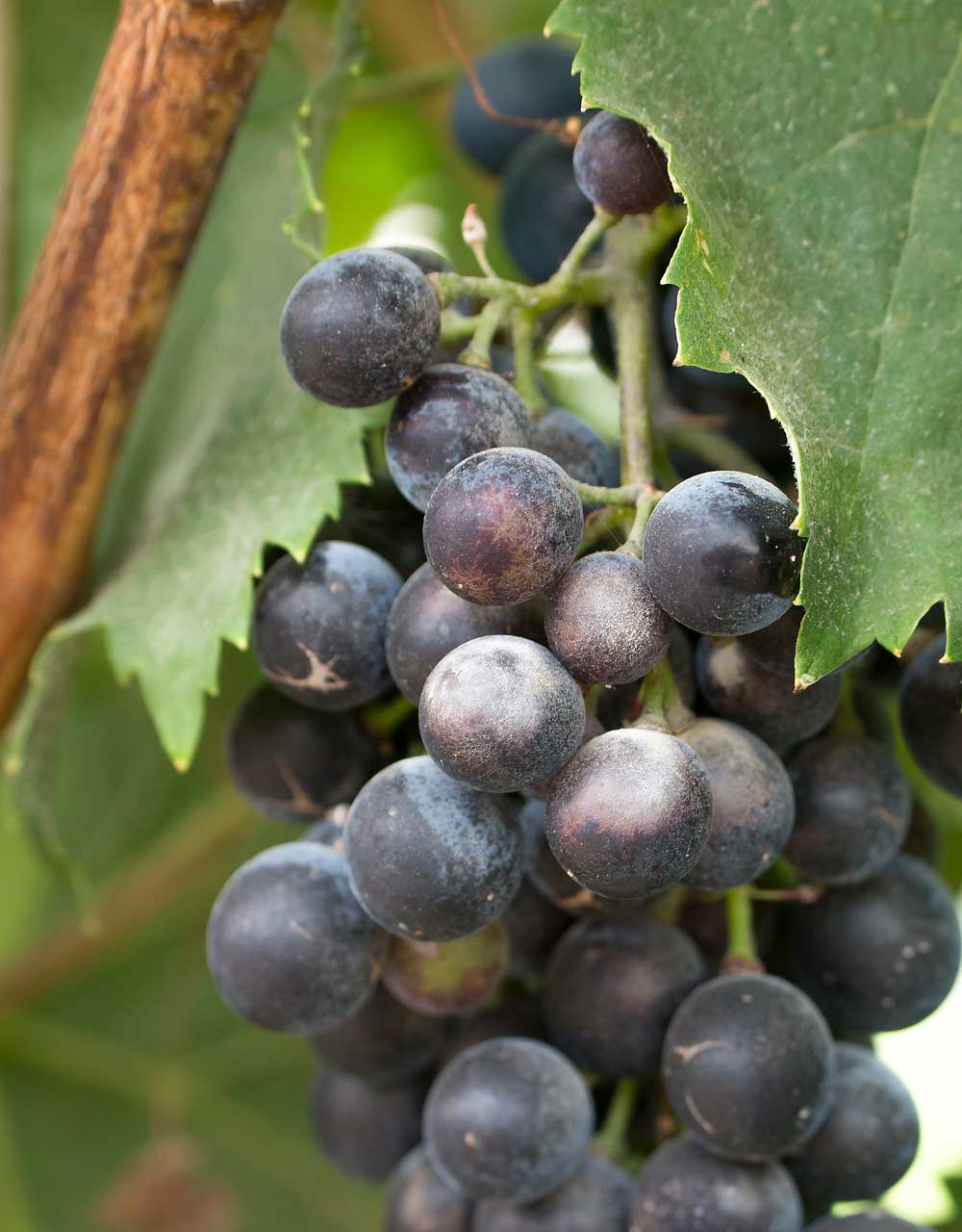Research projects supported by Washington wine grape growers and wineries helped leverage funding for two new federal grants to Washington State University scientists: One is a national effort to understand and reduce the impact of fungicide resistance to grape powdery mildew, and the other will translate large sets of data into actionable information for grape and fruit growers for irrigation scheduling.
Michelle Moyer, associate professor and viticulture extension specialist with the WSU Viticulture and Enology Program, leads the four-year, $4.75 million grant dealing with powdery mildew resistance. She received an initial $2.4 million in September from the U.S. Department of Agriculture’s National Institute of Food and Agriculture (USDA-NIFA) to fund the first two years of the project. The grant is funded through USDA-NIFA’s competitive Specialty Crop Research Initiative.
WSU’s Manoj Karkee, who leads the agricultural automation and robotics lab at WSU’s Center for Precision and Automated Agricultural Systems, is the principal investigator of the project titled “Smart Irrigation — Big Data approach for accurate water stress detection and precision irrigation in fruit crop.” The grant, totaling nearly $700,000, was also funded by USDA-NIFA.
Powdery mildew resistance
Powdery mildew is an ongoing problem worldwide in grapes and other specialty crops such as apples, cherries and hops. Growers use a variety of tactics to control powdery mildew, including application of effective fungicides to protect their crops. But resistance is an ever-present fear in disease management programs; history has shown that fungal pathogens can quickly adapt and become resistant to fungicides. Since 2016, reports of failed powdery mildew management have surfaced in California, Oregon and Washington grape production, despite well-formulated spray programs of sterol inhibitor (SI) or demethylation inhibitor (DMI) and quinone outside inhibitor (Qol) fungicides.

Powdery mildew in Cabernet Sauvignon grapes in Pasco, Washington, in September 2017. (TJ Mullinax/Good Fruit Grower)
Growers have no useful system to monitor or predict fungicide resistance. Resistance is usually identified after control measures fail and crop losses are incurred. The new SCRI grant aims to tackle resistance before it becomes a problem by arming grape growers with data and predictive tools on the potential for fungicide resistance so they can better manage, design and implement resistance stewardship programs. The project is titled “Fungicide Resistance Assessment, Mitigation and Extension Network for Wine, Table and Raisin Grapes,” or FRAME Network for short.
Washington research
The Washington wine industry has supported WSU grapevine powdery mildew research for many years. Moyer’s current grape powdery mildew fungicide resistance research, in its second of three years, is funded by the statewide grape and wine research program. In collaboration with Walt Mahafee, scientist for USDA’s Agricultural Research Service in Corvallis, Oregon, the project is surveying Washington wine grape vineyards to map fungicide resistance. The information will help identify risk for neighboring vineyards and also determine if regional practices might encourage resistance selection. In the project’s first year, 95 percent of the 247 powdery mildew samples tested positive for the resistant or mixed allele (gene). Preliminary results from the second-year survey found that 88 percent of the 120 samples submitted were resistant.
FRAME
In addition to Washington research, the FRAME project greatly expands on existing powdery mildew resistance work in California by the American Vineyard Foundation and in Oregon by the Oregon Wine Board. Research funding in all three states — totaling about $600,000 — was used to leverage the $4.75 million grant.
The diverse and multidisciplined FRAME research team includes Moyer, Mahafee, Phillip Brannen, University of Georgia; Monica Copper, University of California Cooperative Extension; Ana Maria Espinola-Arrendondo, WSU; Ivey Melanie, Ohio State University; Tim Miles, Michigan State University; Ioannis Stergiopoulos, University of California-Davis; and Rob Stoll, University of Utah.
The team will create faster tests to detect fungicide resistance; develop service centers in U.S. grape regions to help put the new resistance tests into practice; model weather and topography to better predict resistance and spread; and evaluate vineyard management strategies to provide growers with tools to mitigate and manage resistance that has already developed. Lastly, the financial impacts of implementing practices to prevent resistance will be calculated.
The FRAME network has application to other specialty crops that face fungicide resistance challenges. The goal: more effective use by growers of fungicides for disease management and sustainable production for grapes and other specialty crops.
Smart Irrigation
The Washington wine industry’s roughly $50,000 support for a project led by WSU viticulturist Markus Keller, optimizing irrigation strategies for white wine varieties, helped to leverage a $691,000 Smart Irrigation grant from USDA-NIFA.
There is no shortage of data being collected to help growers estimate plant water demand. A variety of plant water potential and soil moisture probes and techniques are available, as are canopy spectral images. But putting the data all together, accounting for real time and variability, and translating the data into actionable information for growers, is the hard part of irrigation scheduling.
This project aims to integrate multiple types of spatial and temporal data — things such as sensor images, soil moisture and climate data — with data fusion and mining tools and human-in-the-loop machine learning to result in large-scale, data-driven decisions in precision irrigation. The idea marks a departure from traditional irrigation management approaches because it requires the ability to analyze and extract meaning from Big Data, the new buzzword for large sets of data. It is also unique because it will assess water status at the plant level by understanding the variability in different parts of individual canopies.
The long-term goal of the project is to improve crop quality and yield with minimal water for real-time control of a smart, precision irrigation system. Collaborators on Karkee’s Smart Irrigation project include Keller, Qin Zhang, director of the precision and automated agricultural systems center at the Prosser research station; and Yinghui Wu, computer scientist. •
-by Melissa Hansen






THANKS! PORT GARDNER BAY WINERY